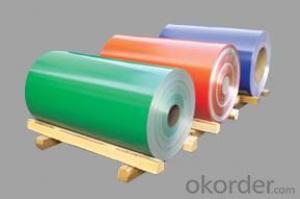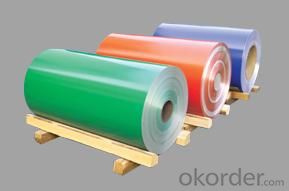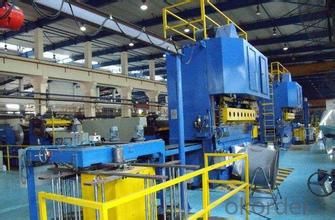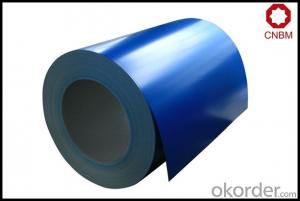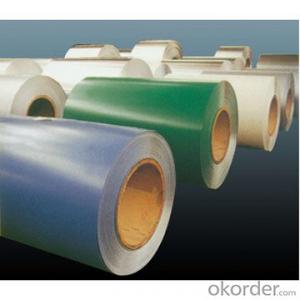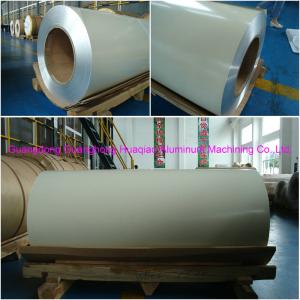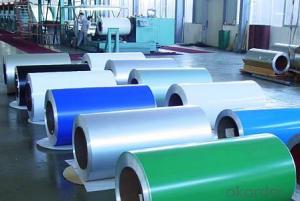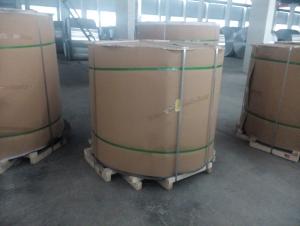Pvc Aluminum Coil Stock Pre Paint Aluminum Rolled
- Loading Port:
- China Main Port
- Payment Terms:
- TT OR LC
- Min Order Qty:
- -
- Supply Capability:
- -
OKorder Service Pledge
OKorder Financial Service
You Might Also Like
Aluminium is a relatively soft,durable, lightweight, ductile and malleablemetalwith appearance ranging from silvery to dull gray, depending on the surfaceroughness. It is nonmagnetic and does not easily ignite. A fresh film ofaluminium serves as a good reflector (approximately 92%) of visible light and an excellent reflector (asmuch as 98%) of medium and far infrared radiation. The yield strengthof pure aluminium is 7–11 MPa, while aluminium alloys have yield strengths ranging from200 MPa to 600 MPa. Aluminium has about one-third the density and stiffness of steel.It is easily machined, cast, drawn and extruded.
Aluminium alloys (or aluminum alloys; see spellingdifferences) are alloysin which aluminium(Al) is the predominant metal. The typical alloying elements are copper, magnesium,manganese,silicon,tin and zinc. There are twoprincipal classifications, namely casting alloys and wrought alloys, both of which are furthersubdivided into the categories heat-treatableand non-heat-treatable. About 85% of aluminium is used for wrought products,for example rolled plate, foils and extrusions.Cast aluminium alloys yield cost-effective products due to the low meltingpoint, although they generally have lower tensile strengthsthan wrought alloys. The most important cast aluminium alloy system is Al–Si,where the high levels of silicon (4.0–13%) contribute to give good castingcharacteristics. Aluminium alloys are widely used in engineering structures andcomponents where light weight or corrosion resistance is required
Features:
1. Excellent quality of products
2. Quick delivery
3. Best service to clients
4. BV,SGS avalible
5. No buckle o waveness
6. Tension leveling
7. Certificate of Origin
8. Form A,E
Packaging Detail: Carton ,Wooden pallet with plastic protection packing,standard seaworthy packing or as your request.
ProductionCapacity:
AnnualProduction capacity of 600,000 tons.
Products areexported to United States, Canada, U.A.E, Brazil, Mexico,Thailand, Vietnam,Nigeria etc, over 100 countries andregions all over the world.
Coveredfactories with full production line
CNBM aluminumproduction base is comprised of 18 aluminumannealers, 10 coil and foilmills, 4 continuous production lines, 2hot rolling production line and 3prepainted lines.
FAQ:
1. What is the form of payment?
Normally 30% TT, L/C
2. Type of quotation?
FOB, CFR, CIF
3. Port of loading?
Shanghai port
4. Delivery time?
30 day after client’s deposit
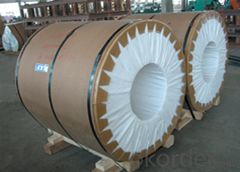
- Q: What is the difference between hot-rolled and cold-rolled aluminum coils?
- The main difference between hot-rolled and cold-rolled aluminum coils lies in the manufacturing process and the resulting properties of the finished product. Hot-rolled aluminum coils are produced by heating aluminum ingots at high temperatures and then passing them through rollers to achieve the desired thickness and shape. This process makes the aluminum more malleable and allows for greater flexibility in terms of shape and size. Hot-rolled coils are typically larger in size and have a rougher surface finish compared to cold-rolled coils. On the other hand, cold-rolled aluminum coils are manufactured by cooling down the hot-rolled coils and then passing them through rollers at room temperature. This process not only reduces the thickness of the aluminum but also improves its surface finish, making it smoother and more aesthetically pleasing. Cold-rolled coils are typically thinner and have a more consistent thickness compared to hot-rolled coils. The differences in the manufacturing process and surface finish of these two types of coils result in different mechanical properties. Hot-rolled aluminum coils are generally less strong and have lower tensile strength compared to cold-rolled coils. However, hot-rolled coils are more ductile and can be easily formed and shaped without cracking. On the other hand, cold-rolled coils have higher tensile strength and are more suitable for applications requiring greater strength and durability. In summary, hot-rolled aluminum coils are larger, have a rougher surface finish, and are more malleable, while cold-rolled aluminum coils are thinner, have a smoother surface finish, and are stronger. The choice between hot-rolled and cold-rolled coils depends on the specific requirements of the application, such as strength, surface finish, and formability.
- Q: What is the thermal conductivity of aluminum coils?
- The thermal conductivity of aluminum coils is high, making them efficient in transferring heat.
- Q: Can aluminum coils be used in high-altitude environments?
- Yes, aluminum coils can be used in high-altitude environments. Aluminum is known for its lightweight and corrosion-resistant properties, which make it suitable for various applications, including those in high-altitude environments. Additionally, aluminum has a high strength-to-weight ratio, allowing it to withstand the challenges posed by high altitudes.
- Q: Can aluminum coils be used for electromagnetic shielding?
- Yes, aluminum coils can be used for electromagnetic shielding. Aluminum is a good conductor of electricity and can effectively block or divert electromagnetic radiation. Its high conductivity and ability to create a Faraday cage make it a suitable material for shielding against electromagnetic interference (EMI) in various applications such as electronics, telecommunications, and power transmission.
- Q: What are the maximum and minimum coil weights available?
- The maximum and minimum coil weights available vary depending on the specific product and supplier. It is best to consult with the supplier or check the product specifications for accurate information on the available coil weight ranges.
- Q: How does the gauge of aluminum coils affect their performance?
- The gauge of aluminum coils directly influences their performance. Thicker gauge coils are more durable and resistant to physical damage, making them suitable for heavy-duty applications that require high strength and durability. On the other hand, thinner gauge coils are lighter and more flexible, making them more suitable for applications that require flexibility and ease of bending. Additionally, the gauge also affects the thermal conductivity and electrical resistance of the coils, with thinner gauges offering higher conductivity. Therefore, the gauge of aluminum coils plays a crucial role in determining their performance characteristics and suitability for specific applications.
- Q: Can aluminum coils be used in food processing applications?
- Food processing applications can utilize aluminum coils, as they offer a range of advantages. Aluminum is a widely used and highly adaptable material in the food industry due to its various benefits. Aluminum coils are lightweight, durable, and possess excellent thermal conductivity, which makes them suitable for applications requiring efficient and uniform heat transfer. When it comes to food processing, aluminum coils are commonly employed in equipment such as heat exchangers, evaporators, and refrigeration units. These coils help to cool, heat, or maintain the temperature of different food products during their processing, storage, or transportation. The exceptional thermal conductivity of aluminum ensures that heat is evenly dispersed, thereby aiding in the preservation of food quality and flavor. Furthermore, aluminum is a non-toxic and non-reactive metal, meaning it has no adverse effects on the taste or composition of the processed food. It is also naturally resistant to corrosion, ensuring that the coils do not contaminate the food and can be easily cleaned and maintained. In addition, aluminum is an environmentally friendly and recyclable material, aligning with the increasing demand for sustainable practices in the food industry. Its lightweight nature also contributes to energy efficiency and reduced transportation expenses. In conclusion, aluminum coils are a reliable, efficient, and safe choice for food processing applications. They meet the strict requirements of the industry while ensuring the quality and safety of the processed food.
- Q: Can a spring balance be used to accurately determine the weight of an aluminum coil?
- <p>Yes, you can use a spring balance to measure the weight of an aluminum coil, but the accuracy depends on the balance's specifications. Ensure the balance has a sufficient capacity to measure the coil's weight and is calibrated correctly. Keep in mind that spring balances are less precise than electronic scales, especially for heavy or sensitive measurements. For high accuracy, consider using an electronic scale designed for industrial use.</p>
- Q: How do you store and transport aluminum coils?
- Aluminum coils are typically stored and transported in a variety of ways depending on their size and weight. They are commonly stored in warehouses or outdoor yards, either horizontally on racks or vertically on stands. To prevent damage and ensure stability, aluminum coils are often stacked securely and separated by wooden blocks or spacers. When it comes to transportation, aluminum coils are usually loaded onto flatbed trucks or shipping containers. They may be secured with straps or chains to prevent movement during transit and to ensure their safe delivery to the desired destination.
- Q: How do aluminum coils perform in extreme temperatures?
- Aluminum coils are known for their excellent performance in extreme temperatures. Unlike other metals, aluminum has a low melting point of 660°C (1220°F), which means it can withstand high heat without melting or deforming. This makes aluminum coils ideal for use in industries that require heat resistance, such as automotive, aerospace, and HVAC. In extreme cold temperatures, aluminum coils also perform exceptionally well. Aluminum has a high thermal conductivity, which allows it to efficiently transfer heat. This means that even in freezing conditions, aluminum coils can quickly and effectively warm up and maintain a consistent temperature. Moreover, aluminum is highly resistant to corrosion, making it suitable for use in various outdoor applications where it may be exposed to harsh weather conditions. It does not rust or deteriorate when subjected to extreme temperatures, making it a durable and reliable choice. Overall, aluminum coils are designed to withstand extreme temperatures, making them a preferred choice for industries that require heat resistance and durability.
Send your message to us
Pvc Aluminum Coil Stock Pre Paint Aluminum Rolled
- Loading Port:
- China Main Port
- Payment Terms:
- TT OR LC
- Min Order Qty:
- -
- Supply Capability:
- -
OKorder Service Pledge
OKorder Financial Service
Similar products
Hot products
Hot Searches
Related keywords
